The Friendly Fire Room Presents
Listen And See
Thank you Wanda Barlow for this great idea!
Genesis Framework Part 40
Genesis Framework Pt 40
Genesis Framework
GF 40 1 Corinthians 15.45-49
June 12, 2016
Part 40
NKJ Ephesians 2:8f
For by grace you have been saved through faith,
and that not of yourselves; it is the gift of God,
not of works, lest anyone should boast.
We have become so used to the positive idea of grace and the negative idea of works with regard to the redemptive process of salvation, that we have generally lost sight of the fact that it was actually the keeping of the covenant of works by Jesus that made salvation possible.
Take hold of this biblical truth—
The original kingdom order in Eden and the subsequent redemptive program of God were both built on the principle of works.
There was a first-man Adam of the earth, and a first covenant of works. And for the redemption of the many out from among the lost world, there is a second and last Adam, the Adam from heaven...
1 Corinthians 15:45-49
45 And so it is written, "The first man Adam became a living being." The last Adam became a life-giving spirit.
46 However, the spiritual is not first, but the natural, and
afterward the spiritual.
47 The first man was of the earth, made of dust;
the second Man is the Lord from heaven.
48 As was the man of dust, so also are those who are
made of dust; and as is the heavenly Man, so also are those who are heavenly.
49 And as we have borne the image of the man of dust,
we shall also bear the image of the heavenly Man.
The process involved in this operation is within the scope
of two covenants, the earthly and the heavenly. There were two covenants of works, but they were not
exactly the same type of covenants in all respects. The first covenant of works was Yahweh Elohim’s
covenant of works with man, which man failed to keep,
and which resulted in temporal death and entrance into
a fallen estate of death, sin and misery; whereas, the
second covenant of works is the eternal covenant, which
we are justified in calling “The Father’s Covenant of
Works with the Son.”
“The Father’s Covenant of Works with the Son” can actually be described as a redemptive covenant, operative in two aspects, the temporal and the eternal.
The temporal and the eternal aspects are interlocked in their relationship; nevertheless, they are clearly distinguishable from each other by the many respects of their differences.
In the temporal covenant aspect of the Father’s Covenant with the Son, there is a series of historical administrations of the gospel, which consists of three parameters that characterize it:
(1) the messianic Son is Lord and mediator of the
covenant.
(2) the second party is the visible church, the community
of confessors of the faith and their children, including
others beside the elect (the invisible portion of the church).
(3) The operative principle is works, leading to common
grace.
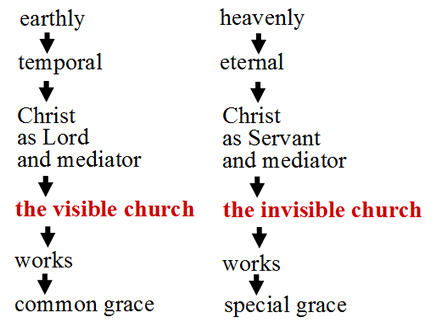
I want to speak briefly to any doubts you may have as to the justification of referring to the Father’s Messianic commissioning of the Son as covenantal. It might be helpful to identify the arrangements of various elements that actually constitute and qualify the use of the term covenant with God.
Let’s begin with this question:
Does the incarnation, life, death, burial, resurrection, and ascension of Christ qualify to be called a covenant with God?
Yes.
These components were derived as the result of the eternal counsel between God the Father, God the Son, and God the Holy Spirit.
Not only was there a plan intimated there, we also find mutual commitment, and divine sanctioning of a covenantal salvific mission.
Jesus’ very identity as Messiah involved commissioning and His awareness of that was revealed often in His statements of awareness of having been sent by the Father on a special mission with a commandment to obey.
For instance…. …a commandment to obey.
NKJ John 10:15
"As the Father knows Me, even so I know the Father;
and I lay down My life for the sheep.
NKJ John 10:17
"Therefore My Father loves Me, because I lay down My
life that I may take it again.
NKJ John 10:18
"No one takes it from Me, but I lay it down of Myself.
I have power to lay it down, and I have power to take it
again. This command I have received from My Father."
…a righteousness to fulfill.
NKJ Matthew 3:14f
And John tried to prevent Him, saying, "I need to be
baptized by You, and are You coming to me?“ But Jesus
answered and said to him, "Permit it to be so now, for
thus it is fitting for us to fulfill all righteousness." Then
he allowed Him.
…a baptism to be suffered.
NKJ Luke 12:49f
“I came to send fire on the earth, and how I wish it were
already kindled! But I have a baptism to be baptized
with, and how distressed I am till it is accomplished!”
…a work to finish.
NKJ John 17:4
"I have glorified You on the earth. I have finished the
work which You have given Me to do.
The special mission of the Son was not an isolated one, but is to be interpreted in the New Testament within the greater context of His fulfillment of various failed covenants.
The scope of the redemptive work of Christ Jesus is absolutely astoundingly in its greatness when you look at it in the larger perspective.
As for the widest scope of mankind altogether, Jesus was sent forth as another Adam, to be the obedient covenant servant that the first Adam failed to be.
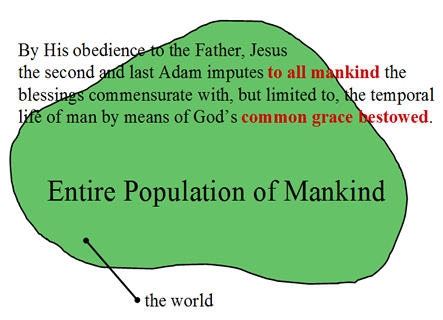
As for the less wide scope we find the body of those called out from among the world by God, Jesus was sent by the Father as one under the law, as the servant of the Lord as the true Israel, the true covenant servant that Israel failed to be.
By His obedience to the messianic mission on earth, which began in heaven, the Father covenanted to the Son a kingship on Zion over the uttermost parts of the earth, and grants Him by oath an eternal royal priesthood kingdom.
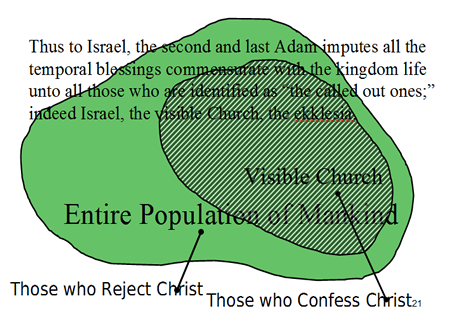
However, it is just as Paul tells us, that all who call themselves “Israel” are not actually “Israel.”
NKJ Romans 9:6b
For they are not all Israel who are of Israel,
Actual Greek word order:
“Not indeed all kinds of the individuals out from within Israel these Israel.”
Actual Greek word syntax:
“Indeed (of) all kinds of the individuals out from within Israel, these (all) (are) not Israel.”
Here now is exactly what the Greek is saying, but translated into pictorial words…
If we could read the hearts of men just as God is able to read hearts…and we took hold of the large basket marked “Israel”…then we dumped out its entire content of people… then systematically examined the heart of each one individually... we would discover that some are tagged with the words, “of true Israel”…while the rest are tagged, “not of true Israel.”
This framework of the gospel and the covenant gives solid explanation and answers to a variety of question that have been raised throughout the centuries of the history of the Christian church.
For example…
NKJ Matthew 7:24 "
Therefore whoever hears these sayings of Mine, and does them, I will liken him to a wise man who built his
house on the rock:
NKJ Matthew 7:20
"Therefore by their fruits you will know them.
NKJ Matthew 7:22
"Many will say to Me in that day, 'Lord, Lord, have we
not prophesied in Your name, cast out demons in Your
name, and done many wonders in Your name?'
NKJ Matthew 7:21
" Not everyone who says to Me, 'Lord, Lord,' shall enter
the kingdom of heaven, but he who does the will of My
Father in heaven.
The point I want to focus on is the calling upon the name of the Lord Jesus as a confession with the mouth as to a form of faith in Him.
The real question is that of the real character of the faith demonstrated in these instances; is whether the faith involved reflects an earthly, temporal kind, or an eternal, heavenly kind.
Obviously Jesus, who knows men’s heart, sees in these cases faith limited to a shifting profession of the tongue and not from a firm conviction of the heart-reflection of faith emanating from an eternal perspective.
NKJ Romans 10:9
that if you confess with your mouth the Lord Jesus andbelieve in your heart that God has raised Him from the
dead, you will be saved.
This faith is confessional and heart-bound, consisting of the temporal and the eternal.
NKJ Philippians 2:11
and that every tongue should confess that Jesus Christ is Lord, to the glory of God the Father.
This faith will be strictly confessional response to the revelation of truth now made obvious; but here, a heart condition void of faith is presupposed.
NKJ Romans 10:10
For with the heart one believes unto righteousness,
and with the mouth confession is made unto salvation.
Be careful how you interpret this.
While a certain degree of salvation blessings of a
temporal kind does apply to those who confess the name
of Jesus and are therefore included in the membership
of the visible church, the salvation referred to here is
indeed eternal in scope, and presupposes the existence of
both a mouth and heart faith combination.
NKJ 2 Corinthians 9:13
while, through the proof of this ministry, they glorify
God for the obedience of your confession to the gospel
of Christ, and for your liberal sharing with them and all men,
Those who enjoy the benefits of possessing purely confessional-temporal faith, even though void of eternal faith, are capable of doing great acts of unselfish sharing of blessings that indeed glorify God and inspire men.
Romans 5.19 makes it plain that, “For as by one man’s disobedience many were made sinners, so by the obedience of one shall many be made righteous.”
Now, we need to form a more definitive picture of the identity of those whom Paul was referring to as the “many were made sinners” compared with the “many will be made righteous.”
As for the narrowest scope we find the body of those
called out from among the world by God from before
the beginning of creation to be His possession, Jesus was
sent by the Father as one under the law, as the servant of
the Lord, as the great Shepherd of the sheep, He tends to
all those given unto the name of Christ, as His bride, as
the church invisible, and the true body of Christ, for
eternity.
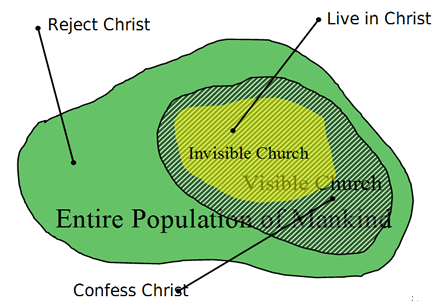
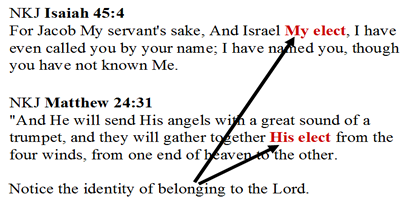
NKJ John 17:9-17
“I pray for them. I do not pray for the world but for
those whom You have given Me, for they are Yours.
And all Mine are Yours, and Yours are Mine, and I am
glorified in them.
Now I am no longer in the world, but these are in the world, and I come to You. Holy Father, keep through Your name those whom You have given Me, that they may be one as We are.
While I was with them in the world, I kept them in Your name. Those whom You gave Me I have kept; and none of them is lost except the son of perdition, that the Scripture might be fulfilled. But now I come to You, and these things I speak in the world, that they may have My joy fulfilled in themselves.
I have given them Your word; and the world has hated them because they are not of the world, just as I am not of the world. I do not pray that You should take them out of the world, but that You should keep them from the evil one. They are not of the world, just as I am not of the world. Sanctify them by Your truth. Your word is truth.”
AMEN
Copyright June, 2016
Rev. Jim Craig
All Rights Reserved